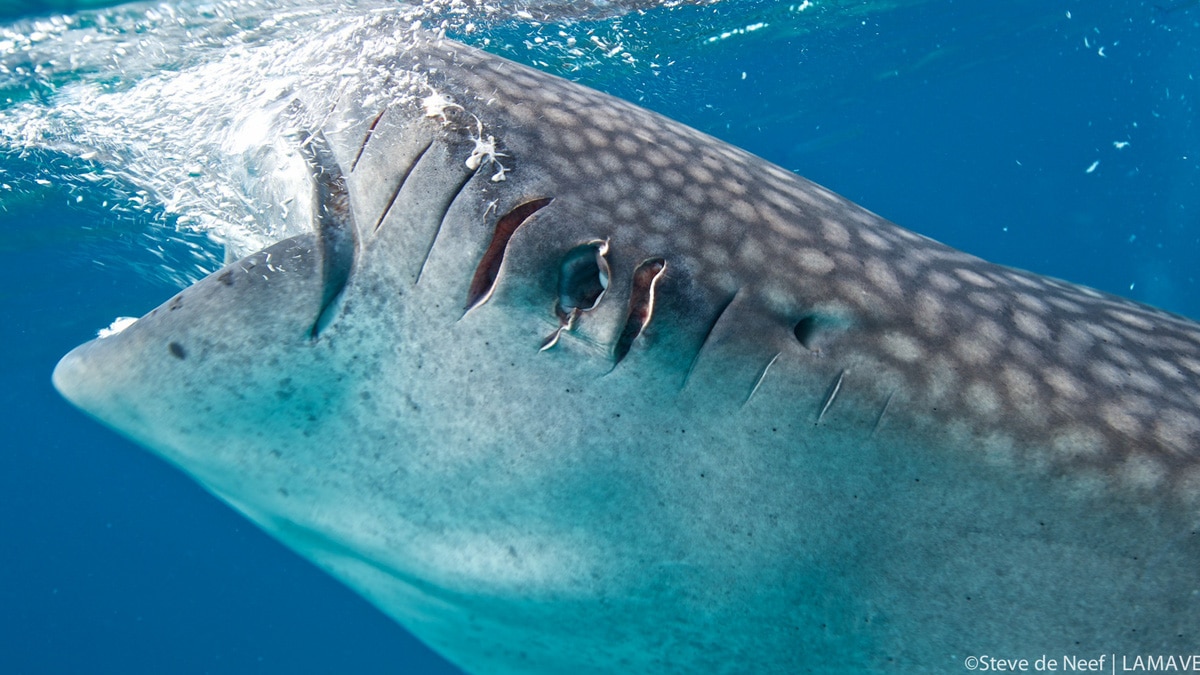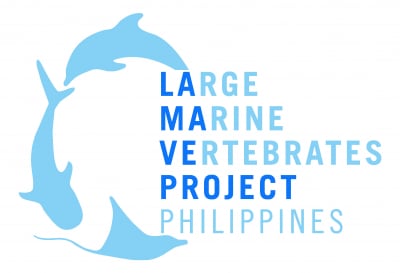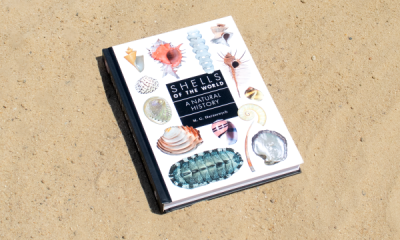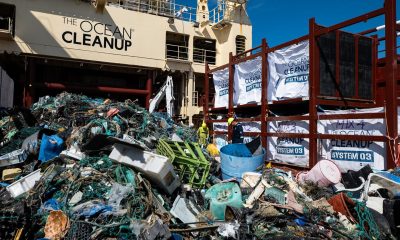Marine Life & Conservation
LAMAVE reports increased injuries on endangered whale sharks in Oslob

 A new study published by LAMAVE in the journal Aquatic Conservation, Marine and Freshwater Ecosystems presents the results of some of the work conducted since 2012 to assess the impacts of tourism activities on individual whale sharks in Oslob, Cebu.
A new study published by LAMAVE in the journal Aquatic Conservation, Marine and Freshwater Ecosystems presents the results of some of the work conducted since 2012 to assess the impacts of tourism activities on individual whale sharks in Oslob, Cebu.
The study found that individual whale sharks observed in barangay Tan-Awan, where the butanding are hand-fed daily to enable the tourism interactions, show a significantly higher number of injury, and scars than whale sharks in other non-provisioned (non-fed) tourism sites in Australia, Mozambique and the Seychelles. The study highlights the increased risk for these sharks that regularly visit the provisioning site in Oslob, and underline the urgent need to implement proper management interventions to guarantee the tourism activities do not harm these endangered animals.
The study presents results from photographic images of 152 individual whale sharks collected by the researchers from Large Marine Vertebrates Research Institute Philippines over a period of 34 months (March 2012 – January 2015) in Oslob, Cebu. The team used photo-identification (photo-ID) to monitor individual whale sharks’ presence and movement and gathered data on the presence, size, type and location of scars on the whole body of these gigantic animals as well as the accumulation of these scars over time. These scarring patterns of whale sharks in Oslob were compared with quantitative studies from Ningaloo in Australia, the Seychelles and Mozambique, other known global aggregations where feeding the whale shark is prohibited and enforced.
The study found that whale sharks in Oslob were significantly more scarred than any other studied population: 95% of all whale sharks in Oslob had scars on their body, with abrasion being the most common type of scar. Most of the scars were categorised as nicks and abrasions and were most likely due to the close contact of ropes, small boats at the provisioning site. Lacerations, which fall into the major category, were observed on 28% of individuals, which is significantly higher than in Ningaloo and Mozambique. These were caused by boat propellers of different sizes and could be facilitated both from the habituation to boats caused by the practice of hand-feeding the whale sharks, as well as the increased traffic of motorized vessels in the surroundings of the provisioning area.
Whale sharks that were observed more frequently in the interaction area showed a significantly higher rate of scarring compared to individual sharks that were seen less frequently in the area; these regular visitors to Oslob accumulated scars over the observation period and suggest a direct causal link between the exposure to the tourism activities in Barangay Tan-Awan and scarring rates. Scars and wounds, even when non-lethal, may pose a serious risk to these endangered species, increasing the physiological stress of the animals, facilitating the contraction of diseases carried by pathogens like virus and bacteria and decreasing overall the health of the affected individuals.

Scars on the head and mouth of a whale shark in Oslob, Cebu at different stages of inflammation and tissue reaction. These scars are caused by continuous contact and rubbing against hard surfaces like outriggers and boat hulls, and are similar to what observed in whale shark kept in captivity in aquaria. Credit: ©LAMAVE
“This study presents evidence of the negative physical impacts of the tourism activity on the whale sharks in Oslob. I have seen myself the wounds on these endangered and enigmatic animals; injuries which highlight the need for an urgent change in Oslob.” – Lead author Luke Penketh
Management solutions to reduce the physical impact of tourism on whale sharks
The high incidence of injuries in the whale sharks provisioned in Oslob is a national concern and there is an urgent need to improve management practices to protect this endangered species. The whale shark is protected by Republic Art No. 9147 ‘Wildlife Resources Conservation and Protection Act.’ whereby it is illegal to maltreat and/or inflict injuries on threatened wildlife, and this is further reinforced by the DOT-DA-DILG-DENR Joint Memorandum Circular no.01 series of 2020 (Sect. 8) where it prohibits acts in dedicated interactions sites that would hinder an animals’ health, including injury and distress. The Philippines is a signatory country to the UNEP Convention on Migratory Species (CMS), where the signatories agree and recommend the strict regulation, monitoring and enforcement of the whale shark tourism interaction activities to ensure its sustainable management and conservation value as highlighted in the Concerted Action for the Whale Shark (UNEP/CMS/Concerted Action 12.7, 2017).
The results highlighted in this study, when paired with the existing knowledge on the migratory nature of this species and connectivity between the archipelago, where individual whale sharks identified in Oslob have been re-sighted in Donsol (Sorsogon Region V) Sogod bay (Southern Leyte Region VIII), Tubbataba Reef Natural Park (Palawan Region VIa), Misamis Oriental (Region 10) and nationally connected further abroad to Malaysia, Indonesia and Taiwan, call the National Department of Tourism, Department of Environment and Natural Resources and the Department of Agriculture – in collaboration with the Department of Interior and Local Government to urgently intervene to ensure the sustainable management the tourism activities in the municipality of Oslob, as well as in other Regions, to ensure the long term balance between the socio-economic benefit of the local communities, the conservation of the marine environment and preservation of endangered protected species like the whale sharks.
For more information about the work of LAMAVE visit the website by clicking here.
Blogs
The Ocean Cleanup Breaks 10,000,000 KG Barrier

The Ocean Cleanup, the global non-profit project, has removed a verified all-time total of ten million kilograms (22 million lbs.) of trash from oceans and rivers around the world – approximately the same weight as the Eiffel Tower.
To complete its mission of ridding the oceans of plastic, The Ocean Cleanup uses a dual strategy: cleaning up the Great Pacific Garbage Patch (GPGP) to remove the plastic already afloat in the oceans, while stopping the flow of plastic from the world’s most polluting rivers.
Through cleaning operations in the GPGP and in rivers in eight countries, the cumulative total of trash removed has now surpassed ten million kilograms. This milestone demonstrates the acceleration of The Ocean Cleanup’s impact, while underlining the astonishing scale of the plastic pollution problem and the need for continued support and action.
While encouraging for the mission, this milestone is only a staging point: millions more tons of plastic still pollute our oceans and The Ocean Cleanup intends to continue learning, improving and innovating to solve this global catastrophe.
This announcement comes as governments from around the world meet to continue negotiations to develop a new legally binding instrument to end plastic pollution at INC4 in Ottawa, Canada. Representatives of The Ocean Cleanup will be in attendance and the organization will be urging decision-makers to collaborate towards a comprehensive and ambitious global treaty which addresses plastic at all stages of its life cycle and in all marine environments worldwide, including in areas beyond national jurisdiction.
It is encouraging to see that the need for remediation is reflected in the various options for potential treaty provisions. It is essential that the final treaty contains clear targets for the remediation of legacy plastic pollution, and reduction of riverine plastic emissions.
Tackling plastic pollution requires innovative and impactful solutions. The treaty should therefore incentivize the innovation ecosystem by fostering innovations that make maximal use of data, technology and scientific knowledge – such as those designed and deployed by The Ocean Cleanup.
‘After many tough years of trial and error, it’s amazing to see our work is starting to pay off – and I am proud of the team who has brought us to this point.’ said Boyan Slat, Founder and CEO of The Ocean Cleanup. ‘While we still have a long way to go, our recent successes fill us with renewed confidence that the oceans can be cleaned.’
The Ocean Cleanup was founded in 2013 and captured its first plastic in 2019, with the first confirmed catch in the GPGP coming soon after the deployment of Interceptor 001 in Jakarta, Indonesia. After surpassing one million kilograms of trash removed in early 2022, the non-profit project has since progressed to the third iteration of its GPGP cleaning solution, known as System 03, and a network of Interceptors currently covering rivers in eight countries, with more deployments set for 2024.
About The Ocean Cleanup
The Ocean Cleanup is an international non-profit organization that develops and scales technologies to rid the world’s oceans of plastic. They aim to achieve this goal through a dual strategy: stemming the inflow via rivers and cleaning up the legacy plastic that has already accumulated in the ocean. For the latter, The Ocean Cleanup develops large-scale systems to efficiently concentrate the plastic for periodic removal. This plastic is tracked and traced through DNV’s chain of custody model to certify claims of origin when recycling it into new products. To curb the tide via rivers, The Ocean Cleanup has developed Interceptor™ solutions to halt and extract riverine plastic before it reaches the ocean. Founded in 2013 by Boyan Slat, The Ocean Cleanup now employs a broadly multi-disciplined team of approximately 140. The foundation is headquartered in Rotterdam, the Netherlands.
For more information, visit: theoceancleanup.com and follow @theoceancleanup on social media.
Marine Life & Conservation
Steve Backshall to headline Shark Trust’s flagship event: For the Love of Sharks

Join a host of amazing, shark loving, speakers including Steve Backshall and the Shark Trust team for an evening celebrating shark conservation at the Royal Geographical Society in London this November.
Date: 29th November 2024
Time: 6-10pm
Location: Royal Geographical Society, London
Tickets: https://www.sharktrust.org/Event/flos24
The event will be a celebration of all things shark. Those lucky enough to get hold of tickets will hear from engaging guest speakers with a passion for sharks.
The line-up includes (*subject to change if unforeseen circumstances arise)
Steve Backshall: One of television’s busiest presenters, BAFTA award-winning wildlife expert Steve has been passionate about the wild world ever since he was young.
Steve’s impressive TV career has taken him all around the world, investigating a wide array of species and environments. Steve has filmed over 100 hours of children’s wildlife programmes with the BAFTA award winning Deadly 60 franchise and recently, with Sky Nature, for his new series ‘Whale with Steve Backshall’. He has been a patron for the Shark Trust for 10 years.
Simon Rogerson: is a photojournalist specialising in natural history, diving and the sea.
He is editor of SCUBA magazine, the official journal of the British Sub-Aqua Club. Simon started his career as a crime reporter but gravitated towards his ‘less depressing’ interest in underwater exploration, joining the staff of DIVE magazine in 1999. In 2005 he was named ‘Editor of the Year’ in the PPA’s Independent Publishing Awards. Simon also works as a freelance writer, contributing frequently to the Sunday Times and Telegraph, in addition to BBC Wildlife, Esquire, and a host of international diving magazines. He is the author of a book, Dive Red Sea, published by Ultimate Sports. Now based in Berkshire, Simon has been a Patron of the Shark Trust for 20 years.
More speakers to be announced soon. Head to the Shark Trust website to learn more.
The evening will also allow guests the final chance to see the Oceanic 31, shark art exhibition. Some of the artwork will be auctioned/raffled at the event, while the rest will be auctioned online to raise money for the Shark Trust Oceanic Programme.
For the Love of Sharks is an evening with something for everyone who is interested and fascinated by sharks. Join the Shark Trust, their Patrons, Trustees and Staff, along with a host of supporters for this celebration of shark conservation.
For more information or to buy a ticket: https://www.sharktrust.org/Event/flos24
-

 News3 months ago
News3 months agoCapturing Critters in Lembeh Underwater Photography Workshop 2024: Event Roundup
-

 Marine Life & Conservation Blogs3 months ago
Marine Life & Conservation Blogs3 months agoCreature Feature: Swell Sharks
-

 Gear Reviews4 weeks ago
Gear Reviews4 weeks agoGEAR REVIEW – Revolutionising Diving Comfort: The Sharkskin T2 Chillproof Suit
-

 Blogs2 months ago
Blogs2 months agoMurex Resorts: Passport to Paradise!
-

 Blogs3 months ago
Blogs3 months agoDiver Discovering Whale Skeletons Beneath Ice Judged World’s Best Underwater Photograph
-

 News3 months ago
News3 months agoPADI Teams Up with Wellness Brand Neuro to Drive Ocean Change and Create a Blue State of Mind
-

 Gear Reviews3 months ago
Gear Reviews3 months agoGear Review: Oceanic+ Dive Housing for iPhone
-

 Marine Life & Conservation2 months ago
Marine Life & Conservation2 months agoSave the Manatee Club launches brand new webcams at Silver Springs State Park, Florida

















